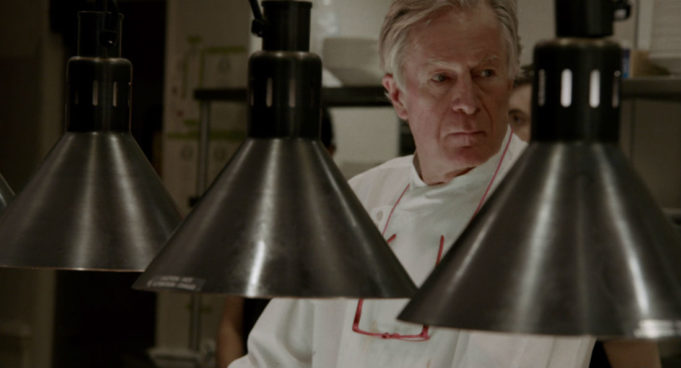I got a sinking feeling in the first few minutes of Jeremiah Tower: The Last Magnificent. That stretch of this documentary features a lot of luminaries of the food world talking about the chef from the title, describing him as a forgotten genius and the first celebrity chef and a “game-changer.” Blah blah blah, what’s for dessert? But then, Anthony Bourdain says, “There’s a locked room inside Jeremiah Tower. I sure haven’t been there. I don’t think many people have.” You don’t say? Do tell us more!
So begins Lydia Tenaglia’s film, which opens at AMC Grapevine Mills this weekend. She profiles Tower, who fell into cooking after pursuing an architecture degree at Harvard. As he grew up in the 1950s, his wealthy parents gave him a life of luxury with trips all over the world, but his philandering father and alcoholic mother tended to lose track of his whereabouts for weeks at a time when he was little. For this unloved kid, food became an escape. “I could read menus before I could read books,” he says, reading excerpts aloud from his diary. “They meant more to me than any fantasy novel.” From an unofficial education gleaned from reading old cookbooks, his flair for cooking led him to a little Berkeley restaurant called Chez Panisse, where he and legendary restaurateur and food guru Alice Waters led a revolution in the trade with their emphasis on fresh ingredients and American cuisine, rooted in classic French techniques but unafraid to break out into new directions.
Many chef documentaries are content to show us their subjects preparing delicious dishes for their diners and the camera. This one lets us see Tower fry some octopus in garlic and chile paste for himself, but otherwise it tends to ignore the food in favor of portraying this chef as a tortured artist. His voice given an upper-class tinge by a childhood at boarding schools in England and France, Tower demonstrates the intelligence and magnetism that made him an object of desire even more than his good looks. People from Chez Panisse detail the sexual tension that flowed between him and Waters (despite his homosexuality) that energized the kitchen before exploding over his allegations that she had plagiarized his recipes. Though his manners are courtly, he shows peremptory steeliness when discussing her, as well as when he gets back in charge of the kitchen at New York’s Tavern on the Green.
The movie really shines when it covers the high point of Tower’s career, after he left Chez Panisse and opened his own Stars Restaurant in San Francisco in the 1980s. As witnesses like Mario Batali and Ruth Reichl attest, he didn’t just want to make good food, he wanted to give his customers the feeling of being in a dream world full of astonishing experiences. Thus, Stars’ huge, dramatic interior space with the then-new innovation of allowing diners to see inside the kitchen as the cooks prepared their food. The restaurant was a smash success big enough to garner national press, with political elites, socialites, working stiffs, punk rockers, and drag queens all contributing to a heady mixed atmosphere. After it closed, Tower disappeared for more than a decade, leaving fans and colleagues mystified. The answer, it would seem, is that having achieved his dream establishment, he didn’t want to start over unless he could re-create that. Looking back on his childhood, Tower says, “The worst thing that ever happened to me was I wasn’t born an orphan.” I wonder: What might he have done if he hadn’t been rich? As the movie catches him in the present day, he seems to have inherited a good share of his parents’ wealth. He can afford to walk away and spend a decade scuba diving in Mexico. What if he’d been forced to do something else?
The movie details other factors in Stars’ demise: overfranchising, an ugly court battle that made Tower a target of San Francisco’s gay activists, the damage wrought by the Bay Area earthquake. Still, Tower is irreducibly an artist on a grand scale, incapable of running a discreet little 20-seat bistro. He needs the flash, the drama, the scenesters and celebrities oohing and aahing over his dishes. That explains his otherwise puzzling decision to come out of seclusion in early 2015 to run Tavern on the Green, a venue with a bad reputation whose gigantic size works against the careful control over the kitchen that Tower is used to. (Bourdain calls the place “a chef-killer.”) The Tavern’s seating capacity makes Tower think he can make this restaurant into an international tourist draw, but he’s working with owners who know nothing about food, whose promise not to interfere with the kitchen doesn’t last two months.
In the end, Tenaglia doesn’t succeed in breaking into that locked room inside Tower, but Jeremiah Tower: The Last Magnificent does give a haunting portrait of its protagonist whose tormented background gave him a vision of creating a place above the concerns of the ordinary world, buoyed by his culinary creations. He wages a lonely pursuit of that vision, whatever the costs. The thing is, he knows he has the talent to pull it off. Is that a gift or a curse? Those are your menu options.
Jeremiah Tower: The Last Magnificent
Starring Jeremiah Tower. Directed by Lydia Tenaglia. Rated R.












